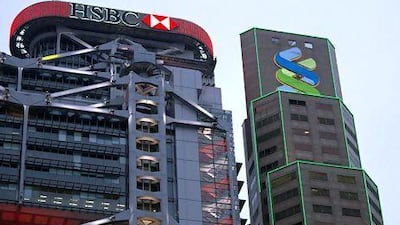Worldwide investment banking deals may be bouncing back, but the Middle East remains a difficult place for dealmakers.
There is a lot of good news so far this year. Middle Eastern mergers and acquisitions (M&A) deals have totalled US$4.1bn (Dh15.05bn) so far this year, up 41 per cent from the corresponding period last year, according to data from Thomson Reuters.
Qatar National Bank's $2.5bn offer for the Egyptian arm of Société Générale was waved through by the country's financial regulator last month, while Dubai Islamic Bank received the green light from the UAE Central Bank to acquire the 41.8 per cent of mortgage lender Tamweel it does not already own.
And a three-way fight is brewing over Vivendi's $6bn stake in Morocco's Maroc Telecom, with an acquisition sought by Etisalat, South Korea's KT and Ooredoo, the company formerly known as Qatar Telecom.
But bankers are cautious about the prospects for regional M&A deals suddenly becoming unbottled. "Deals are few and far between," said one investment banker, speaking on condition of anonymity. "Relatively speaking, these are big deals by regional standards, but I don't see at this stage that M&A is back."
Many are not fresh deals, instead the result of inter-governmental discussions that started long before the recent upturn in financial markets.
In many ways, 2012 was the best of times and the worst of times for the Middle East's biggest investment banking arms.
Debt underwriters had their best year yet, but income nevertheless fell because of bad debts still lingering from the financial crisis. But most other investment banking business lines had another lacklustre year.
Last week, both HSBC and Standard Chartered reported declining income from their investment banking divisions during 2012, despite the fact that the two led a record year for bond and sukuk sales.
HSBC's global banking and markets division reported profits before tax in the Middle East of $581 million during 2012, a 9.6 per cent decline compared with 2011, which the bank attributed to write-downs of a few large trading positions and a decline in advisory fees with deals still scarce.
Standard Chartered's wholesale banking division reported a 16.1 per cent dip in operating profit from the region to $577m during the same period, with charges for bad debts rising and operating income slightly down.
A fall in income from the UAE, which generates about half of Standard Chartered's regional income, hampered overall growth, although the bank's trade finance and corporate finance divisions reported brisk trading.
Most other investment banking activities found opportunities scarce, however. Banks including Deutsche Bank, Morgan Stanley and Rothschild have moved senior staff back to London, with a drought in deal volumes resulting in a reduced need for personnel.
"You tend to get lazy if you don't adjust your staff on a long-term basis," said one executive at an international bank, noting that many banks found themselves disappointed after over-hiring during 2011 as the global economy began a recovery that was thwarted by the fresh eruption of the euro-zone debt crisis last year.
Banks including Nomura, Barclays and Citibank have recently begun increasing staff numbers in the region, with skilled corporate finance and compliance teams particularly in vogue as staff lost to London during the financial crisis move back to Dubai.
Standard Chartered has arranged for a steady trickle of its top bankers covering Africa to relocate from Dubai to Johannesburg during the past two years, echoing a similar move by Barclays in 2011 when 123 Dubai-based positions were shifted to South Africa. But whether the M&A pipeline will become unblocked in the region this year is a question that divides opinion among bankers. Citibank's head of M&A for the Middle East and Turkey has headed to London to take on an expanded role, although Citi "maintains a robust on-the-ground investment banking presence in the Middle East", the bank said.
Elsewhere, Standard Chartered has hired a new head of M&A from Royal Bank of Scotland, and Barclays, the region's biggest M&A adviser last year, told Bloomberg this month it expected investment banking fees to rise during the year ahead.
Others are unconvinced by the prospects for opportunistic acquisitions within the region.
There may be a need for consolidation in sectors including construction and banking, but this is unlikely to form a major part of a "modest" pipeline of M&A deals expected in the year ahead, said Luc Luyten, a managing partner of Bain and Company in the Middle East and a member of the advisory board at CVC Capital Partners, the private equity firm.
But the competition for assets among financial firms and family companies in the Middle East was slim compared with previous booms, he added.
"The days that you could walk around and find an undervalued small firm that you could buy and make a killing on are gone," he said.

